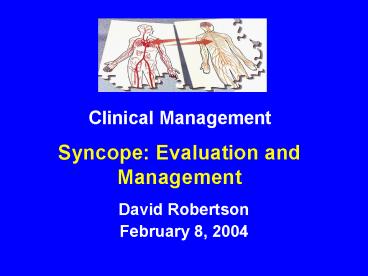Syncope: Evaluation and Management - PowerPoint PPT Presentation
1 / 31
Title:
Syncope: Evaluation and Management
Description:
Water ( 40 mmHg!) Food (-30mmHg!) SECOND LINE: Physical Maneuvers. Exercise (in water) THIRD LINE: Fludrocortisone Salt. Pressor Drugs (midodrine) LBP ... – PowerPoint PPT presentation
Number of Views:135
Avg rating:3.0/5.0
Title: Syncope: Evaluation and Management
1
Syncope Evaluation and Management
Clinical Management
- David Robertson
- February 8, 2004
2
Cardiovascular Continuum
LBP
POTS
Normotension
Labile HBP
HBP
NMS
Bradycardia/hypotension 500,000 Americans
Orthostatic tachycardia
500,000 Americans
Orthostatic hypotension
100,000 Americans
3
Cardiovascular Continuum
LBP
POTS
Normotension
Labile HBP
HBP
NMS
Bradycardia/hypotension 500,000 Americans
asymptomatic
Orthostatic tachycardia
symptomatic
500,000 Americans
Orthostatic hypotension
100,000 Americans
4
Cardiovascular Continuum
LBP
POTS
Normotension
Labile HBP
HBP
NMS
Bradycardia/hypotension 500,000 Americans
Orthostatic tachycardia
500,000 Americans
Orthostatic hypotension
Severe Dysautonomias
100,000 Americans
5
Orthostatic Hypotension in Autonomic Failure
52 year old male
6
Therapy of Severe Dysautonomias
- FIRST LINE
- Water (40 mmHg!)
- Food (-30mmHg!)
- SECOND LINE
- Physical Maneuvers
- Exercise (in water)
- THIRD LINE
- Fludrocortisone Salt
- Pressor Drugs (midodrine)
7
Cardiovascular Continuum
LBP
POTS
Normotension
Labile HBP
HBP
NMS
Bradycardia/hypotension 500,000 Americans
Mild Dysautonomias
Orthostatic tachycardia
500,000 Americans
Orthostatic hypotension
100,000 Americans
8
POTS
EKG
BP
HR
Tilt Angle
9
Postural Tachycardia SyndromePOTS
- Upright symptoms without hypotension
- Upright tachycardia
- 500,000 Americans usually young women
- Antecedent infection surgery pregnancy
- Partial dysautonomia
- Tx low dose (10 mg tid) propranolol
10
Cardiovascular Continuum
LBP
POTS
Normotension
Labile HBP
HBP
NMS
Bradycardia/hypotension 500,000 Americans
Mild Dysautonomias
Orthostatic tachycardia
500,000 Americans
Orthostatic hypotension
100,000 Americans
11
Syncope (NMS)
EKG
BP
HR
Tilt Angle
12
Syncope
- Transient loss of consciousness
- with loss of postural tone
- followed by recovery
13
Syncope
Swoon Emotional Dysautonomia Viral? Swallowing Sta
nding Arrhythmia
14
Syncope The Problem
- Loss of consciousness is common
- Long differential diagnosis
- Most benign some fatal
- Treatment requires diagnosis
15
Why Do We Faint ?
- Blood/Injury/Fear
- Pain, blood, medical procedures, fright
- After minutes or hours of upright posture
- Generally standing or quiet sitting
- Worse in heat or warm stuffy rooms
- Probably related to tilt test syncope
- Within 30 seconds of arising from sitting or
lying - Probably increased conductance in muscle bed
- Can occur with starting to walk after quiet
standing - At or immediately after peak heavy exercise
16
Hypotension and Sinus Arrest During Venipuncture
100
BP (mm Hg)
80
60
40
20
ECG
0
5
10
15
20
25
30
35
40
45
50
Time (sec)
17
Syncope Common Symptoms
- Frequent symptoms or signs
- Nausea
- Diaphoresis
- Pallor
- Fatigue
- Myoclonic twitches
- Frequent presyncopal spells
- Improvement on lying down
18
Syncope Rate in Young Adults
- 12-48
- (usually no medical attention)
19
Syncope
- 3-5 of all ER visits (35admitted)
- Syncope 1o diagnosis 1-6 of admits
- 1,000,000 new patients evaluated yearly
- Prevalence 0.7 in young 6.0 in old
- Tends to be young women and old men
20
Syncope Impact
- Recurrent syncope Rheumatoid arthritis
- Maybe home schooling
- Maybe lose your job
- Maybe injury Falls 4th cause of death
- Pacemaker may make you uninsurable
21
Neurally Mediated Syncope
- Recurrent (gt3) syncope
- No cardiac lesion
- Especially in young
- Rarely life-threatening
- Most gradually improve
22
Case 1
- 21 year old woman
- Syncope during choir practice
23
No W/U Required
- If syncope has an obvious cause
- If there is no cause for concern
- But if in facility HP plus EKG
24
Case 2
- 21 year old woman
- Syncope during basketball competition
25
Evaluation of Syncope I
- Is there structural heart disease ?
- Hx
- PE
- ECG
- Echo
- Monitoring (loop recorder)
26
Case 3
- 21 year old woman
- Syncope during class
- Father died suddenly at 34
27
Evaluation Of Syncope II
- Tilt-Table Test
- EP (Electrophysiological) Study
- Butonly BP, HR during spontaneous syncope is
definitive.
28
Tilt-Table Test Positivity
- Normal Subjects
- Syncope Patients
- 13
- 24-75
MEV Petersen, Heart 2000 84 509-514
40 normal positivity at Vanderbilt
29
Therapy of Syncope
- No drug or device proven helpful
- Rate-drop pacemaker
- Drugs sometimes employed
- Propranolol
- Fludrocortisone
- SSRIs
- Yohimbine
30
16 oz Water Effect on Tilt Tolerance
31
Vanderbilt University Autonomic Dysfunction
Center

